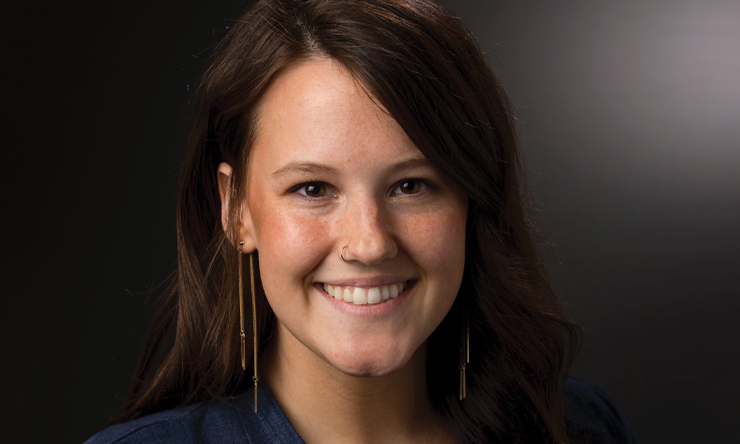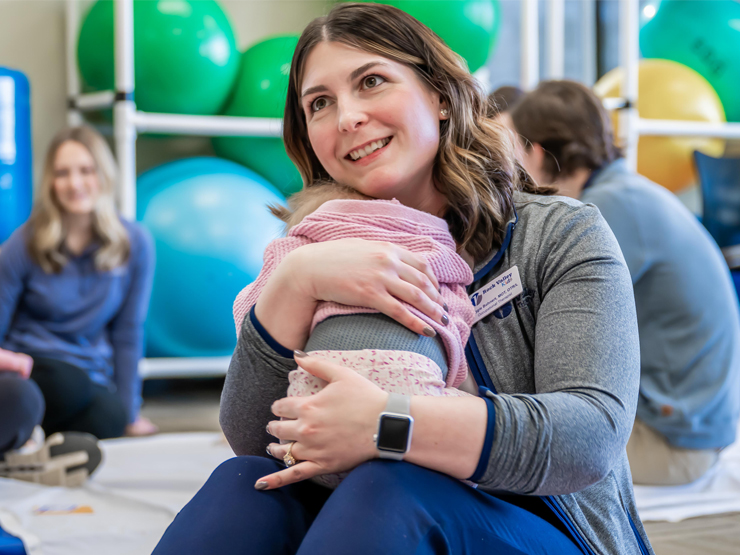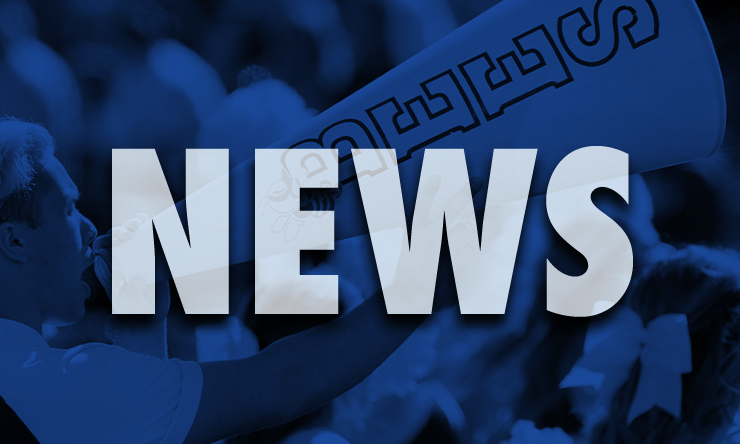Experiential learning is a critical piece of most St. Ambrose University programs and, often, it is a fast track to jobs.
From internships to clinical partnerships, students find opportunities to connect their classroom learning to the real world. Within professional settings, they build their confidence and expand their skills. They graduate equipped with the academic and workplace experience to get a job and advance in their careers.
"Absolutely. There is no doubt that internships lead to employment," said Kim Matteson, director of the St. Ambrose University Career Center. "Just by talking to students, I know this is how they find full-time positions a lot of the time, and the research shows that to be true."
According to a 2017 National Association of Colleges and Employers study, 64.5 percent of employers preferred to hire candidates with relevant work experience, and 56 percent preferred that experience come from an internship.
St. Ambrose students recognize the edge they gain. In a poll of 402 undergraduates conducted in December 2017 and May 2018, almost 80 percent said they had completed an internship, clinical placement, student teaching, or field practicum, and many of them had done so voluntarily.
By fall 2022, St. Ambrose plans to see that 100 percent of undergraduates complete an internship, clinical placement, study abroad or service opportunity before they graduate.
"The College of Health and Human Services places high value on clinicals, internships, practicums, and field work," said Sandra Cassady, PhD, vice president for strategic initiatives at St. Ambrose and dean of the College of Health and Human Services (CHHS).
"Many of our programs are accredited by outside agencies and our students are required to have a minimum number of hours of clinical experience. Almost always, we exceed that number because we value the opportunity for our students to practice in a setting where they are working with licensed professionals in the field," she said.
Students can learn in a lecture setting, build their knowledge through role-playing, and demonstrate their skills in a simulation lab. "But nothing can substitute true practice," Cassady said. "All the different things we do to prepare our students - help them build confidence, skills, and knowledge - gets put into practice at an actual work setting."
And they get it. For many of the CHHS graduate programs that lead to health care careers, clinicals make up one-third to one-half of the credit hours needed to graduate. Cassady said the college has more than 1,800 contracts with clinical partners. In 2018, it coordinated 1,712 placements for graduate and undergraduate students enrolled in health science and psychology programs. Students completed clinical placements in 31 states and five countries.
As for CHHS undergraduates, they too are on-site and involved. Education majors spend 109 hours in classrooms before their senior year, then add to their experience with a semester of student teaching.
The same is true for College of Business programs. Students who major in health or business sales must complete an internship. International business majors can get real world, hands-on work experience abroad.
The College of Arts and Sciences (CAS) offers 34 undergraduate programs and many - such as engineering and forensic psychology - require students to complete an internship. In a 2017 survey of CAS programs, many students said they are choosing to gain workplace experience, even when it is not required.
In the Women and Gender Studies program, 95 percent of the majors enroll in an elective field practicum course and complete a minimum 80-hour internship.
Program director Katy Strzepek said her students have worked on-site at SafePath, in Davenport schools, the Kahl Home, World Relief, the Safer Foundation, Community Healthcare, and at the Scott County Courthouse.
"We talk a lot in class about inequities and how race, class, gender, and religion intersect to impact a person's life. We read about the causes of poverty, why women are discriminated against, about hate and inequity," Strzepek said.
"An internship allows these students to connect what they've learned about justice and advocacy to making real change in the world. And, in the process, our students learn about their own identity and how they can develop intercultural competency so they can become allies."
Matteson said many employers use internship programs as a recruiting pipeline. The Career Center has established partnerships with employers in the region and throughout the U.S. At any given time, there are 60 to 80 internships positions posted on BeeCareers, and global companies such as HNI Corporation specifically participate in SAU-hosted job fairs to recruit students for its comprehensive summer internship programs.
Lindsay Heinrichs, a community relations generalist with HNI Corp., said the Muscatine-based company hires 80 student interns each summer. Putting their education to work on real projects adds value or helps gain efficiencies, she said. Each intern gets paired with an on-site manager and mentor who guides and offers training opportunities to expand their skills beyond the internship.
Last year, HNI offered 77 percent of its summer interns a full-time job, Heinrichs said. "Our internship program is a perfect way to get to know people to see if they are a good fit for our culture, and vice versa. The ideal situation is to have someone go through the internship program and then be hired for a full-time position."
Paula McNutt, PhD, professor and Dean of the College of Arts and Sciences said experiential learning also provides an opportunity for career exploration. Sometimes the worksite experience allows a student to discover that their "dream" job is not at all what they envisioned. Gaining that perspective helps the student step back, reassess, and match their skills and passion to a new professional goal before completing their education.
McNutt said employers who choose St. Ambrose students for internships quickly realize how valuable a liberal arts education is to their business success. "Our students have a broad educational foundation and they are good communicators and writers. All of those elements are beneficial and apply to whatever position in which they are working."
You Might Also Be Interested In...
Share This Story



